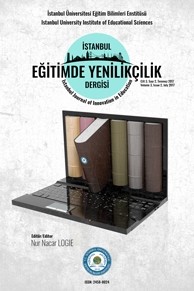AUGMENTED REALITY BASED DESKTOP HISTORY LECTURE: WONDERS OF THE WORLD WITH ANIMATED AGENTS
AUGMENTED REALITY BASED DESKTOP HISTORY LECTURE: WONDERS OF THE WORLD WITH ANIMATED AGENTS
___
- Azuma, R. T. (1997). A survey of augmented reality. Presence: Teleoperators and virtual environments, 6(4), 355-385.
- Azuma, R., Baillot, Y., Behringer, R., Feiner, S., Julier, S., & MacIntyre, B. (2001). Recent advances in augmented reality. IEEE computer graphics and applications, 21(6), 34-47.
- Edwards, I. E. (1972). The pyramids of Egypt. New York: Viking Press. Bammer, A. (1972). Die Architektur des jüngeren Artemision von Ephesos.
- Bostanci, E., Kanwal, N., & Clark, A. F. (2015). Augmented reality applications for cultural heritage using Kinect. Human-Centric Computing and Information Sciences, 5(1), 1-18.
- B. Koyuncu and E. Bostanci, “Virtual reconstruction of an ancient site: Ephesus, “ in Proceedings of the Xlth Symposium on Mediterranean Archaeology. Archaeopress, 2007, pp. 233-236.
- E. Bostanci, N. Kanwal, S. Ehsan, and A. F. Clark, “Tracking methods for augmented reality, “ in The 3rd International Conference on Machine Vision, 2010, pp. 425429.
- Amin, D., & Govilkar, S. (2015). Comparative Study of Augmented Reality Sdk’s. International Journal on Computational Sciences & Applications (IJCSA) Vol, 5. Woldegiorgis, E. (2014). 3D Model Data Source for Wikitude.
- Rivera, J., & van der Meulen, R. (2014). Gartner Says Worldwide Tablet Sales Grew 68 Percent in 2013, With Android Capturing 62 Percent of the Market.
- Garnter Inc. Kaufmann, H. (2003). Collaborative augmented reality in education. Institute of Software Technology and Interactive Systems, Vienna University of Technology.
- Wolfenstetter, T. (2007). Applications of augmented reality technology for archaeological purposes. Technische Universitat Munchen, Tech. Rep.
- Van Krevelen, D. W. F., & Poelman, R. (2010). A survey of augmented reality technologies, DESKTOP HISTORY LECTURE USING AUGMENTED REALITY 22 applications and limitations. International Journal of Virtual Reality, 9(2), 1.
- Cook, B., Ashmole, B., & Strong, D. E. (2005). Relief sculpture of the mausoleum at Halicarnassus. Oxford University Press.
- Laliberte, M. (2013). What are the 7 Wonders of the Ancient World?. Enslow Publishers, Inc.
- 3dfoin - Assets for your games :D. Retrieved December 30, 2016, from http://3dfoin.com/ godstatue.html
- 3D design The Colossus of Rhodes. Retrieved December 30, 2016, from https://www. tinkercad.com/things/krqnNZxvTtw-the-colossus-of-rhodes
- A. Welcome to Autodesk® Character Generator. Retrieved December 30, 2016, from https://charactergenerator.autodesk.com/
- Cohen, E., & Cooper, R. L. (1986). Language and tourism. Annals of Tourism Research, 13(4), 533-563. https://charactergenerator.autodesk.com/
- Cohen, E., & Cooper, R. L. (1986). Language and tourism. Annals of Tourism Research, 13(4), 533-563.
- ISSN: 2458-8024
- Başlangıç: 2015
- Yayıncı: İstanbul Üniversitesi
TÜRKİYE’DE NÖROLOJİK REHABİLİTASYON KAPSAMINDA BİR MÜZİK TERAPİ PROJESİNİN GELİŞTİRİLMESİ
Beril Melina DURSUN, Soner AKYEL, Seda ŞEN, Çağla KARACAN, Begüm Çapa TAYYARE, Tuğba GÖKBEL, Yüksel TAŞÖREN, Erbil DURSUN
ARTIRILMIŞ GERÇEKLİK TEKNOLOJİSİNİN VERİTABANI DERSİNDE KULLANIMI
Mehmet ALBAYRAK, Volkan ALTINTAŞ
AUGMENTED REALITY BASED DESKTOP HISTORY LECTURE: WONDERS OF THE WORLD WITH ANIMATED AGENTS
Mert Can ALICI, Erkan BOSTANCI
An Augmented Reality Interface for Choreography Generation
Tafadzwa Joseph DUBE, Gökhan KURT, Gökhan İNCE
PROBLÉMATIQUE DE CONSTITUTION D’UNE GRILLE D’ANALYSE DE L’ORAL ÉMOTIONNEL
Freiderikos VALETOPOULOS, Julie RANÇON, Efi LAMPROU
Yusuf KALINKARA, Metin KAPIDERE
MATEMATİK ÖĞRETİMİ İÇİN NOKTA BELİRLEME TEKNİĞİNE DAYALI BİR MOBİL UYGULAMA
Eren Deniz GENÇ, Hilal Nur ISSI, Oktay YILDIZ
